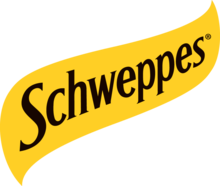Schweppes
 | |
| Type | Carbonated mineral water |
|---|---|
| Distributor | The Coca-Cola Company (Albania, Algeria, Argentina, Belarus, Bosnia and Herzegovina, Brazil, Bulgaria, Chile, Colombia, Costa Rica, Croatia, Egypt, Estonia, Greece, Iceland, India, Indonesia, Ireland, Japan, Kazakhstan, Latvia, Lebanon, Lithuania, Malaysia, Malta, Moldova, Montenegro, Morocco, North Macedonia, New Zealand, Philippines, Romania, Russia, Saudi Arabia, Serbia, Slovenia, South America, South Africa, South Korea, Turkey, Tunisia, Ukraine, United Kingdom, and Vietnam) Jafora-Tabori (Israel) Keurig Dr. Pepper (United States) PepsiCo (Canada) Schweppes Australia (Australia) Suntory (Andorra, Austria, Belgium, Czech Republic, Denmark, Finland, France, Germany, Hungary, Italy, Liechtenstein, Luxembourg, Monaco, Netherlands, Norway, Poland, Portugal, San Marino, Slovakia, Spain, Sweden, and Switzerland) Swire Coca-Cola (China, Hong Kong, and Taiwan) |
| Country of origin | Geneva, Republic of Geneva |
| Introduced | 1783 |
| Website | www |
Schweppes (/ʃwɛps/ SHWEPS,[1][2][3] German: [ʃvɛps]) is a soft drink brand founded in the Republic of Geneva in 1783 by Johann Jacob Schweppe; it is now made, bottled, and distributed worldwide by multiple international conglomerates, depending on licensing and region, that manufacture and sell soft drinks. Schweppes was one of the earliest forms of a soft drink, originally being regular soda water created in 1783.[4] Today, various drinks other than soda water bear the Schweppes brand name, including various types of lemonade and ginger ales.
The company has held the British royal warrant since 1836 and was the official sponsor of Prince Albert's Great Exhibition in Hyde Park, London in 1851.[4]
History
[edit]
In the late 18th century, German-Genevan scientist Johann Jacob Schweppe developed a process to manufacture bottled carbonated mineral water based on the discoveries of English chemist Joseph Priestley.[5] Schweppe founded the Schweppes Company in Geneva in 1783 to sell carbonated water.[6] In 1792, he moved to London to develop the business there. Schweppes had offices in Bristol and were selling carbonated Hotwells water in 1820.[7] In 1843, Schweppes commercialised Malvern Water at the Holywell Spring in the Malvern Hills, which was to become a favourite of the British Royal Family until parent company Coca-Cola closed the historic plant in 2010 to local outcry.[8]
In 1969, the Schweppes Company merged with Cadbury to become Cadbury Schweppes. After acquiring many other brands in the ensuing years, the company was split in 2008, with its US beverage unit becoming Keurig Dr Pepper and separated from its global confectionery business (now part of Mondelez International).[9] Keurig Dr Pepper is the current owner of the Schweppes trademark in Canada and United States.
The Coca-Cola Company owns the Schweppes brand in several territories, including 21 European countries. In a further 22 European countries, the brand is owned by Schweppes International Limited (a subsidiary of Suntory).[10]
In China, Hong Kong and Taiwan, Swire's subsidiary Swire Coca-Cola produces Schweppes branded beverages.[11]
The Japanese Asahi Group bought Schweppes Australia in 2008 from Cadbury,[12] and owns the trademark in Australia.
Mainstay Schweppes products include ginger ale (1870),[13] bitter lemon (1957),[14] and tonic water (the first carbonated tonic – 1871).[15]
Marketing
[edit]During the 1920s and 1930s, the artist William Barribal created a range of posters for Schweppes.[16] In 1945, the advertising agency S.T.Garland Advertising Service Ltd., London coined the word "Schweppervescence",[citation needed] which was first used the following year.[17] Thereafter it was used extensively in advertisements produced by Garlands, who sold copyright of this word to the Schweppes Company for £150 five years later when they relinquished the account.
An ad campaign in the 1950s and 1960s featured a real-life veteran British naval officer named Commander Whitehead, who described the product's bubbly flavour (effervescence) as "Schweppervescence". Comedian Benny Hill also appeared in a series of Schweppes TV commercials in the 1960s.
Another campaign in the 1950s and 1960s, "Schweppeshire", was written by Stephen Potter, the inventor of gamesmanship.[18]
Another campaign, voiced by British actor William Franklyn, made use of onomatopoeia in their commercials: "Schhh… You know who." after the sound of the gas escaping as one opens the bottle.[19][20]
References
[edit]- ^ "Schweppes Ginger Beer advertisement". The New Yorker. 25 March 1950. p. 115.
(rhymes with peps)
- ^ Wells, J. C. (2008). Longman Pronunciation Dictionary, 3rd edn, Harlow, UK: Longman
- ^ Daniel Jones, Peter Roach, et al. (2011). Cambridge Pronouncing Dictionary, 18th edn, Cambridge, UK: Cambridge University Press
- ^ a b "Schweppes Holdings Limited". Royalwarrant.org. Retrieved 13 October 2021.
the world's first ever soft drink, Schweppes soda water [..] the official sponsor of Prince Albert's Great Exhibition in 1851
- ^ "The Great Soda-Water Shake Up". The Atlantic. Retrieved 13 October 2021.
- ^ Morgenthaler, Jeffrey (2014). Bar Book: Elements of Cocktail Technique. Chronicle Books. p. 54. ISBN 9781452130279.
- ^ advert in Bristol Chronicle 13 Jan 1820 p3
- ^ Morris, Steven (21 October 2010). "Malvern Water to cease production". The Guardian. Retrieved 9 September 2020.
- ^ "Cadbury plc Demerger" (Press release). Cadbury plc. 7 May 2008. Retrieved 29 December 2009.
- ^ "Schweppes". Schweppes.
- ^ "Product Portfolio". Swire Coca-Cola. Retrieved 28 May 2021.
- ^ "Schweppes sold for $1.2bn". 25 December 2008. Retrieved 15 August 2020.
- ^ "Ginger Ale | Schweppes". Retrieved 28 February 2018.
- ^ "Schweppes Bitter Lemon". Retrieved 9 November 2010.
- ^ "Premium Mixers | Schweppes". Archived from the original on 2 December 2018. Retrieved 18 May 2017.
- ^ Simmons, Douglas A. (1983). Schweppes® The First 200 Years. London: Springwood Books. ISBN 0-86254-104-2.
- ^ Simmons 1983, p. 80.
- ^ "George Him website". georgehim.co.uk. Retrieved 9 January 2023.
- ^ "Schweppes Tonic Water TV Advert by O & M". Youtube. 12 September 2010. Retrieved 7 March 2013.
- ^ "Schweppes- Für die Macher von heuter". Youtube. Retrieved 2 September 2015.
External links
[edit]- Official website
- Schweppes History Movie - 13 minute video on the history of Schweppes



